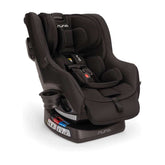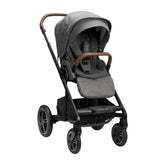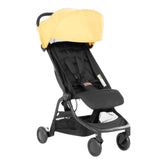A Parenting Dialogue: What to Do About Teething

Q: What is your best teething advice? My 5-month old has some teeth coming in. She's miserable! So far we've tried cold plastic teethers (she hates them), cold washcloth (hates it), and acetaminophen (which doesn't seem to be too effective, and I feel nervous giving her meds every day). I've also tried rubbing gums with my fingers, but I can't have my hand in her mouth 24/7. Please help!
The New Mom
A: I felt the same way when my son was teething. It's heartbreaking to see them in pain! I relied on teething biscuits and lots of distractions. I used biscuits that dissolve easily. They made a mess but were totally worth it. I also used a lot of musical toys and stacking blocks to distract and entertain him while he sat in his high chair. Even just sitting outside and swinging in a hammock calmed him down a lot.
Also, my son seemed to prefer warm things over cold. I'd give him a wash cloth that was dipped in hot water, and he loved it.
-- Shawn, mother of one toddler
The Experienced Mother
A: My best teething advice is that you should always keep in the forefront of your mind that it might not be the teeth. Of course it could be. Sometimes it will be. Offer chewy things. Rub her gums. But the biggest impediment to restoring happiness and comfort is solving the wrong problem.
A teething child still experiences all the other things that make kids fussy and cranky at the same time teeth are coming in. Teething is less painful than most parents believe (children old enough to communicate often don't notice it at all). The soreness they do experience shouldn't last long. There is a stretch in late infancy where teeth are always coming in, but there is so much more going on.
So by all means deploy teethers and pain relievers. But if/when that doesn't work, consider other causes before trying harder on the teeth. There is a reason parents believe those old home remedy placebos are effective. The parents, having "done something," move on. Then credit the placebo when baby is happy again.
-- Katie, mom of four grown children
The Medical Approach
A: If you feel like home remedies just aren't cutting it, talk to your pediatrician about what they recommend from the pharmacy.
- Pain relievers. Doctors advise starting with just one dose of acetaminophen or ibuprofen to soothe a fussy teething baby. Also, check the Food and Drug Administration’s website for information about the safety of children’s medications. If it gets to the point where one dose isn’t enough, consult your pediatrician before doing serial dosing.
- Topical analgesics. When it comes to topical medications containing lidocaine or benzocaine, experts recommend avoiding them altogether. No studies have proven the long-term benefit of these products, and the effects last are don't last long. Meanwhile, your baby is ingesting it and getting high levels of the drug into their bloodstream.
- Homeopathic tablets. Doctors suggest using similar caution (or altogether avoidance) when it comes to herbal remedies. In certain teething tablets, a toxic substance “far exceeding the amount claimed on the label” was discovered during lab testing. Remember, herbal medications are still medications that must be metabolized by the liver and kidneys. The long-term side effects of these herbal remedies are still unknown, so there is a risk.
The Natural Approach
A: Feeling a little nervous about pharmaceutical remedies? There are a number of natural alternatives for soothing the discomfort and fussiness of teething pain – no medication required.
• Teething biscuits. Arrowroot, a starchy product from tuberous roots of plants found in many native cuisines of the Caribbean and South America, can be used to make hard teething biscuits for tender mouths. Try this arrowroot cookie recipe.
• Offer cold foods. If your little one is already eating solids, try offering something cold, like a chilled slice of cucumber. You could also buy a self-feeding teether and put frozen fruit in it. Use caution, however, as this could be a choking hazard.
• Nursing. Breastfeeding can be a wonderful way of soothing your fussy teething baby. Your little one may ask to feed more often, possibly for very short intervals each time. If you're happy to feed them as often as they want, it can really help both of you to get through this tricky time.
• Dietary changes. Inflammation from teething can stimulate nerves that cause pain. Reducing overall inflammation through dietary changes may help relieve your baby’s pain. If your little one is eating solids, white foods, like refined sugar and flour, potatoes, and even dairy, can trigger inflammation. Consider incorporating more paleo-type foods — a variety of fresh fruits and vegetables, pastured meats, wild seafood, and plenty of healthy fats (coconut, avocado, butter, and whole eggs).
• Apply pressure. Pressure can ease teething discomfort. Massaging the sore part of their gums with a clean finger can provide relief. A cold, solid-rubber teether or even a frozen washcloth to chew on can be soothing.
• Utilize the power of distraction. Complaints of pain and irritability often increase at night when your little one has time to dwell on the discomfort.
It’s also important to note there are other natural “home remedies” that may actually harm your baby and should be avoided.
- Don’t give a baby aspirin or massage it into the gums.
- Don’t rub alcohol on the child’s gums.
- Don’t put completely frozen objects directly on the gums.
- Avoid allowing your baby to chew on hard plastic toys. This can negatively impact their an oral health as well as become a choking hazard.
- Avoid amber necklaces and teething beads. Most homeopathic practitioners (along with several major health organizations) now recommend against the use of the jewelry, saying that the risk of choking on one of the beads is too great to ignore and outweighs any potential benefits.

The Takeaway on Teething
Each child responds to teething pain a little differently. Be attentive to your baby for symptoms and start with natural treatments, like cold teething rings, teething biscuits, or cold washcloths in the mouth. The good news is that most babies respond positively to these simple home remedies.
If these treatments don’t relieve symptoms, feel free to ask your pediatrician about the occasional use of over-the-counter baby acetaminophen or ibuprofen. Your doctor can advise whether this is an appropriate treatment and provide guidance on proper dosing.
Be sure to also look for other possible sources of discomfort. Teething will bring on relatively minor symptoms, such as drooling, a slightly elevated temperature, and perhaps more irritability. But it won't cause diarrhea, diaper rash, runny nose, or high fever. If your baby develops these symptoms during the teething phase, something else is probably causing their discomfort — and you should contact your pediatrician.
Remember, teething is a normal part of early childhood. The discomfort is temporary, so the best course of action for most families is to wait it out, do what you can to safely soothe your child, and know that they’ll bounce back quickly.









